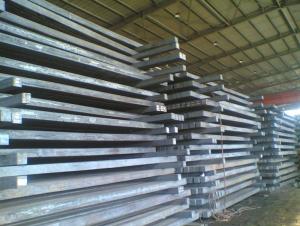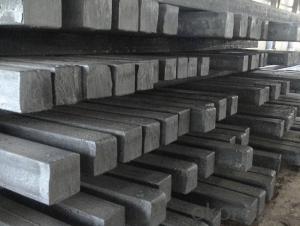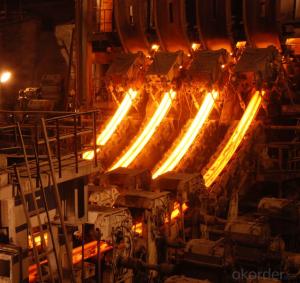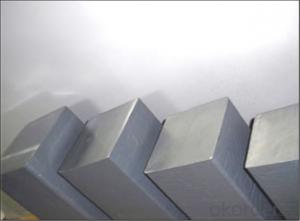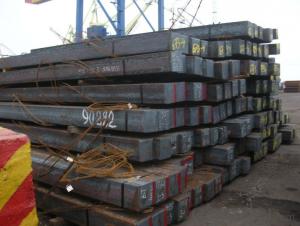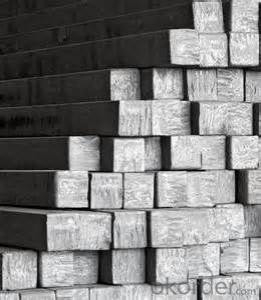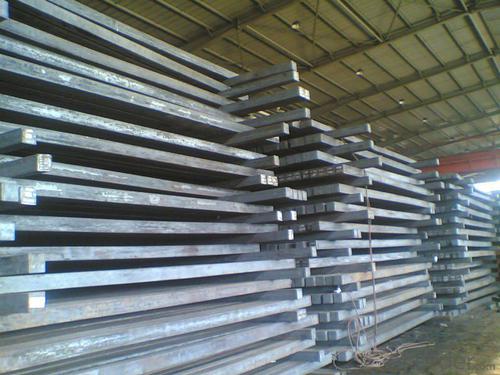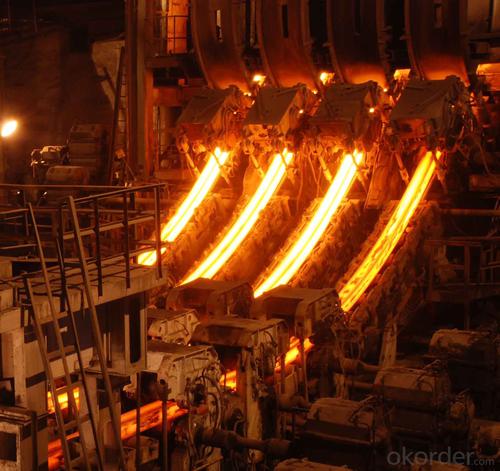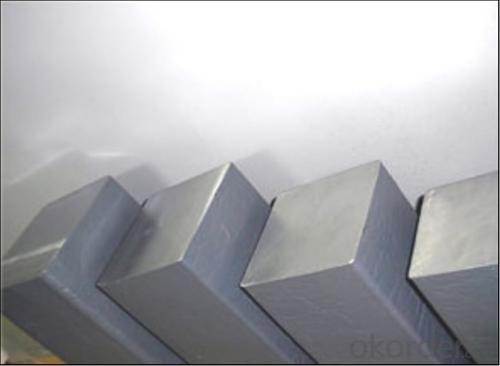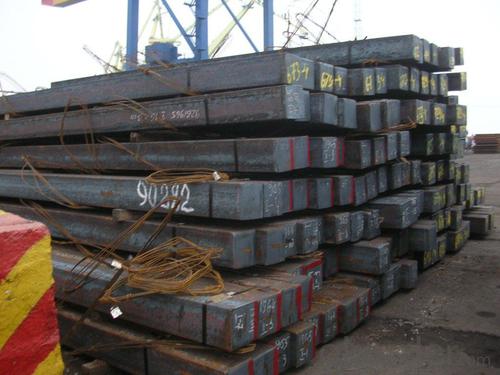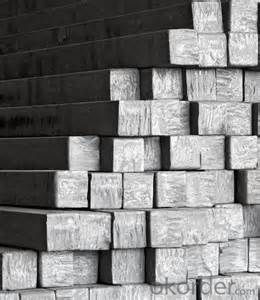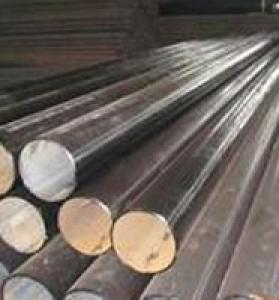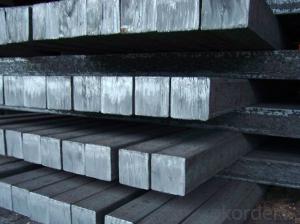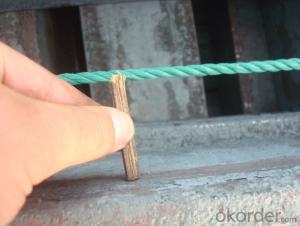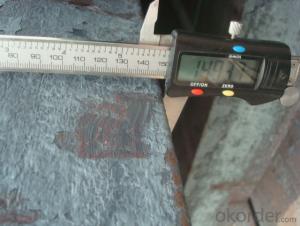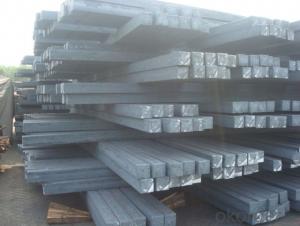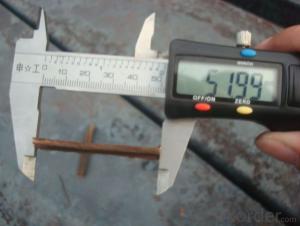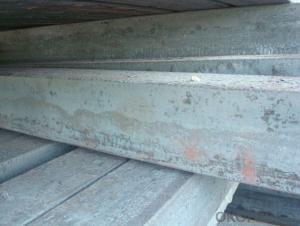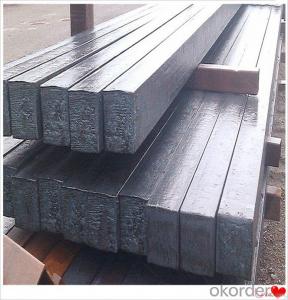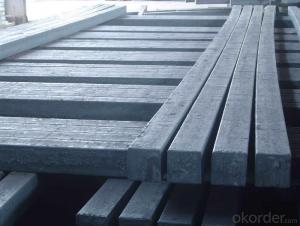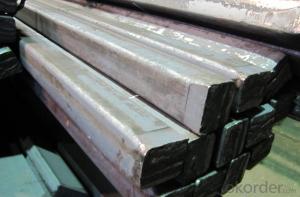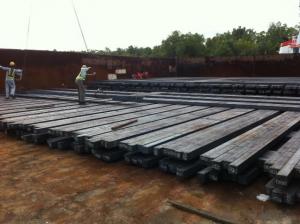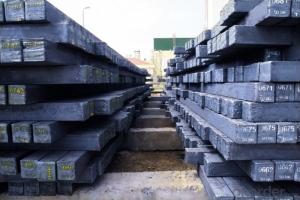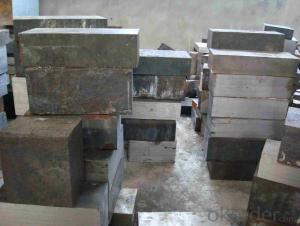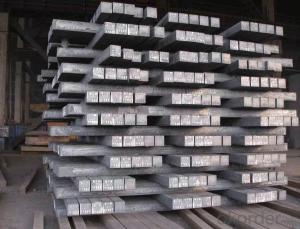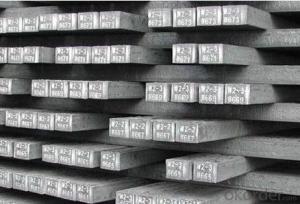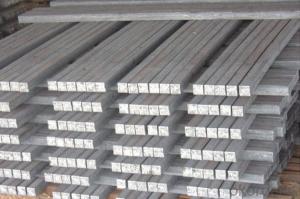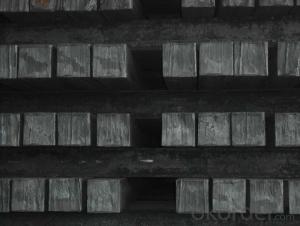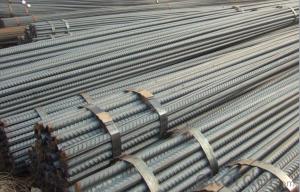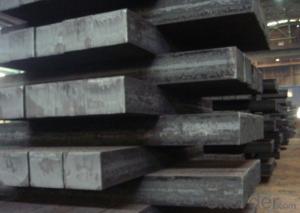Square Steel Billet Q235 3SP Grade Prime Quality 7#
- Loading Port:
- Tianjin
- Payment Terms:
- TT OR LC
- Min Order Qty:
- 2000 m.t
- Supply Capability:
- 50000 m.t/month
OKorder Service Pledge
OKorder Financial Service
You Might Also Like
Description of Square Steel Billet Q235 3SP Grade Prime Quality 7#
M. S. Billets are used for rolling of TMT Re-Bars of Fe415 and Fe500 Grade and various other structural steel products.
CRS Billets are used for rolling of CRS TMT Re-Bars.
Special Alloy Billets are used for rolling of any special grade TMT Re-Bars like Earthquake resistant TMT Re-Bars and for special grade structural steel products.
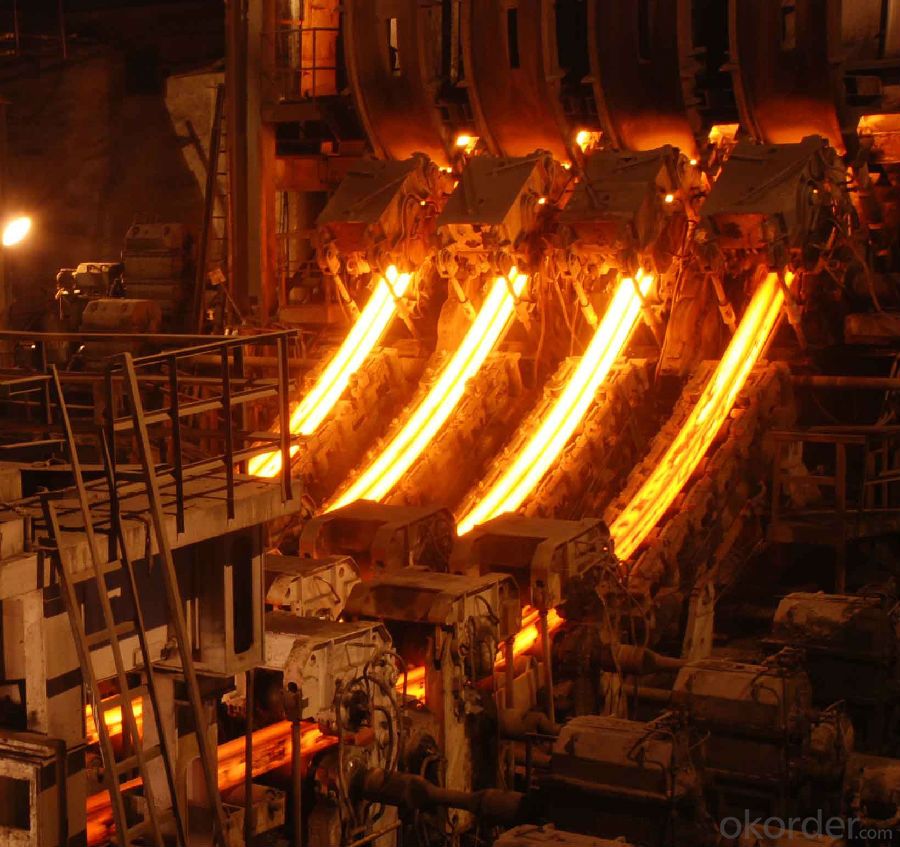
Main Feature Square Steel Billet Q235 3SP Grade Prime Quality 7#
Raw elements(C,Fe,Ni,Mn,Cr,Cu.)---Smelted ingots by AOD finery---hot rolled into black suface---pickling in acid liquid---cold drawn----polished by automatically machine--- cutting into pieces---checking quanlity
Applications of Square Steel Billet Q235 3SP Grade Prime Quality 7#
Widely Used in the areas such as Stainless Steel Fasteners, Chains, Kitchen and Sanitary wares, Furniture handles, Handrails, Electroplating and Electrolyzing pendants, Foods, Electron, Petroleum, Construction and Decoration, etc. Products have a high strength after cold-working. Electronic products parts, Medical appliance, Springs, Bus Inside and Outside packaging and building, Street Lamp Posts, etc. Decoration materials and Outdoor Publicity Billboard. Used for the products which have the Anti-Stress Corrosion requirement. Electron Products, Table-wares, Bolts, Nuts, Screen Meshes, Cumbustors and so on.
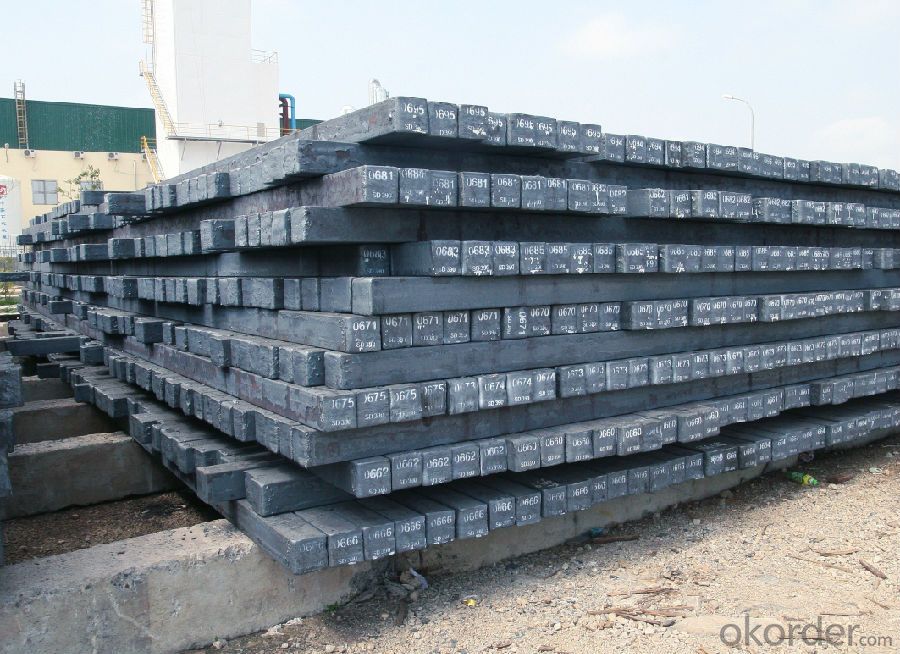
Specifications of Square Steel Billet Q235 3SP Grade Prime Quality 7#
| Standard | C(%) | Mn(%) | S(%) | P(%) | Si(%) |
| Q195 | ≤0.12 | ≤0.50 | ≤0.040 | ≤0.035 | ≤0.30 |
| Q235 | ≤0.20 | ≤1.40 | ≤0.045 | ≤0.045 | ≤0.35 |
| Q275 | ≤0.22 | ≤1.50 | ≤0.045 | ≤0.045 | ≤0.35 |
| 20MnSi | 0.17-0.25 | 1.2-1.6 | ≤ 0.050 | ≤ 0.050 | 0.40-0.80 |
| 3SP | 0.14-0.22 | 0.40-0.85 | ≤ 0.050 | ≤ 0.040 | 0.05-0.15 |
| 5SP | 0.28-0.37 | 0.50-1.00 | ≤ 0.050 | ≤ 0.040 | 0.15-0.30 |
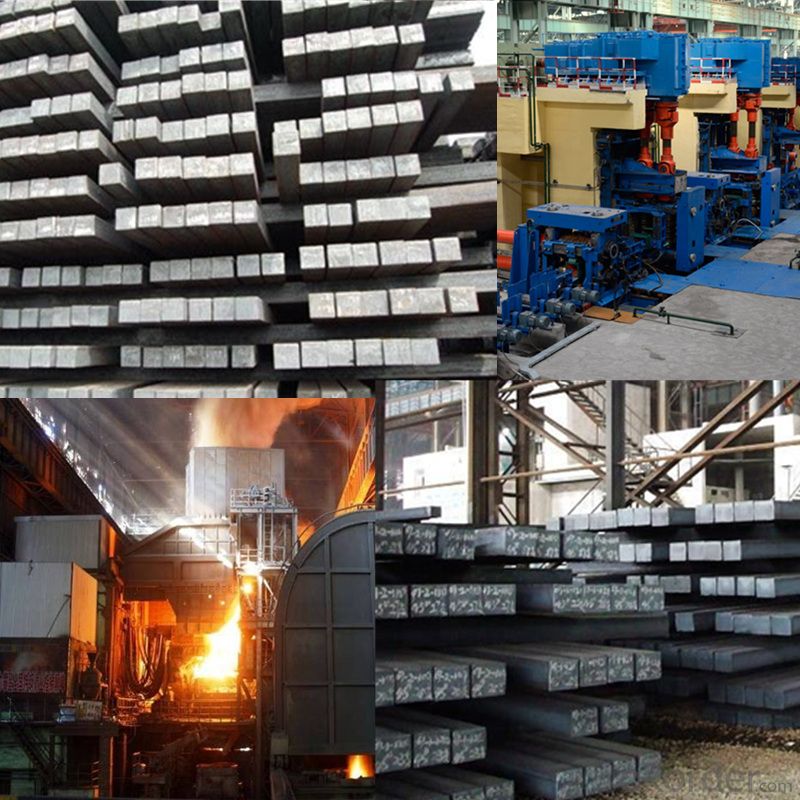
FAQ of Square Steel Billet Q235 3SP Grade Prime Quality 7#
We have organized several common questions for our clients,may help you sincerely:
1. How Can I Visit There?
Our company is located in Tianjin City, China, near Beijing. You can fly to Tianjin Airport Directly. All our clients, from home or aboard, are warmly welcome to visit us!
2. How Can I Get Some Sample?
We are honored to offer you sample.
3. Why choose CNBM?
Our delivery time about 15-20days for standard sizes, if you have other requirements like hardness, quanity and width ,it is about 20-40days. But don't worry we also try our best for the delivery time ,because time longer and our cost is higher.
- Q: What are the different types of defects found in steel billets?
- There are several types of defects that can be commonly found in steel billets. These defects can occur during the manufacturing process or due to external factors. Some of the different types of defects found in steel billets include: 1. Surface defects: These defects are visible on the surface of the billet and can include scale, scratches, cracks, or pits. Surface defects can be caused by improper handling, inadequate cleaning, or excessive heat during the manufacturing process. 2. Internal defects: These defects are not visible on the surface and can only be detected through non-destructive testing methods. Internal defects can include voids, inclusions, segregation, or non-uniform microstructures. These defects can affect the mechanical properties and overall quality of the steel billet. 3. Decarburization: This defect occurs when the surface layer of the billet loses its carbon content due to exposure to high temperatures or oxygen. Decarburization can weaken the billet and reduce its strength and hardness. 4. Shrinkage cavities: Shrinkage cavities are formed when the steel billet solidifies and contracts unevenly. These cavities can lead to reduced mechanical properties and structural integrity. 5. Surface cracks: Cracks can occur during the cooling and solidification process of the billet due to thermal stresses. These cracks can propagate into the interior of the billet, leading to further defects and potential failure. 6. Segregation: Segregation refers to the uneven distribution of elements or impurities within the steel billet. This can result in inconsistent mechanical properties, reduced strength, and poor machinability. 7. Inclusions: Inclusions are foreign particles or impurities that are trapped within the steel billet during the manufacturing process. These inclusions can affect the mechanical properties and can cause defects such as porosity or brittleness. It is essential to minimize and control these defects in steel billets to ensure high-quality finished products. Proper quality control measures, material handling, and manufacturing processes can help reduce the occurrence of these defects and improve the overall quality of steel billets.
- Q: How are steel billets used in the production of automotive braking systems?
- The production of automotive braking systems heavily relies on steel billets, which serve as a vital ingredient. These billets, essentially semi-finished steel products, act as the raw material for further processing. Typically, they are created through the casting process, in which molten steel is poured into molds and allowed to solidify. In the realm of automotive braking systems, steel billets are primarily utilized for the manufacturing of brake rotors or discs. These components play a critical role as they provide the surface on which the brake pads make contact, generating friction and ultimately halting the vehicle. Due to the intense stress and heat experienced during braking, brake rotors require a material that is strong, durable, and heat-resistant – qualities that steel possesses. Once the steel billets are acquired, they undergo a series of manufacturing processes to transform them into brake rotors. Initially, the billets are heated to a specific temperature, enhancing their malleability and making them easier to shape. Subsequently, a process known as forging is employed, subjecting the heated billets to high pressure in order to mold them into the desired form of the brake rotor. This forging process strengthens and fortifies the steel, rendering it resistant to wear and deformation. Following the forging stage, the brake rotor undergoes additional machining processes. This includes the turning of the rotor's surface to ensure it is flat and smooth, providing an even contact surface for the brake pads. Further modifications, such as drilling or slotting, may be performed to enhance heat dissipation and prevent the accumulation of gases or debris between the pad and rotor. These machining processes are vital for achieving the necessary dimensions and surface finish of the brake rotor. Once the brake rotor is manufactured, it is then assembled alongside other components of the braking system – brake calipers, pads, and hydraulic lines – to create a fully functional braking system. The utilization of steel billets in the production of brake rotors guarantees a reliable, durable, and capable braking system that can withstand the demanding conditions of automotive braking. In conclusion, steel billets are indispensable in the production of automotive braking systems, serving as the foundation for the creation of brake rotors – key components responsible for halting vehicles. Through processes such as heating, forging, and machining, the billets are transformed into robust and finely finished brake rotors. The end result is a dependable and long-lasting braking system that ensures vehicle safety and performance.
- Q: What are the different types of steel billet rolling mill equipment?
- There are various types of steel billet rolling mill equipment, including pusher-type, continuous, and semi-continuous rolling mills. Each type is designed to handle different production capacities and provide different levels of automation and efficiency.
- Q: What are the key properties and characteristics of steel billets?
- Steel billets are semi-finished steel products that are rectangular in shape and typically have a square cross-section. They serve as the starting point for the production of various steel products, including bars, rods, and wire. The key properties and characteristics of steel billets include: 1. Composition: Steel billets are primarily made of iron and carbon, with additional alloying elements added to enhance specific properties. The carbon content typically ranges from 0.2% to 0.5%, depending on the desired strength and hardness. 2. Strength and Hardness: Steel billets offer excellent strength and hardness due to their composition and the heat treatment processes they undergo. This makes them suitable for applications requiring high load-bearing capacity and resistance to wear and tear. 3. Ductility: Despite their strength, steel billets also exhibit good ductility, allowing them to be easily shaped and formed into various products through processes like rolling, extrusion, and forging. This makes them highly versatile and adaptable to different manufacturing methods. 4. Homogeneity: Steel billets have a uniform internal structure, ensuring consistency in their mechanical properties throughout the entire material. This homogeneity is achieved through precise casting and cooling processes, which minimize the presence of defects and impurities. 5. Dimensional Precision: Steel billets are manufactured with specific dimensions and tolerances, ensuring the desired size and shape for downstream processing. This dimensional precision enables efficient and accurate production, minimizing waste and maximizing productivity. 6. Surface Quality: Steel billets have a smooth and clean surface finish, free from any significant imperfections or irregularities. This is crucial for subsequent processing steps, as it ensures proper bonding during welding, machining, or coating operations. 7. Heat Conductivity: Steel billets possess excellent thermal conductivity, allowing them to efficiently transfer heat during various manufacturing processes, such as hot rolling or continuous casting. This property ensures uniform heating and cooling, leading to consistent material properties. 8. Corrosion Resistance: Steel billets are susceptible to corrosion if left unprotected. However, they can be coated or treated with anti-corrosive measures to enhance their resistance to rust and other forms of degradation. Overall, steel billets are characterized by their strength, ductility, dimensional precision, and homogeneity. These properties make them a crucial raw material in the steel industry, enabling the production of high-quality steel products used in a wide range of sectors, including construction, automotive, and infrastructure.
- Q: How are steel billets used in the production of gears?
- Steel billets are used in the production of gears as they serve as the raw material from which gears are forged or machined. Steel billets undergo a series of processes such as heating, shaping, and cutting to transform them into the desired gear shape. The billets are carefully crafted and shaped to ensure the highest quality and durability of the gears, allowing them to effectively transmit power and perform their intended function in various machinery and equipment.
- Q: How are steel billets used in the manufacturing of hydraulic equipment?
- Steel billets are an essential component in the manufacturing process of hydraulic equipment. These billets, which are essentially semi-finished steel forms, play a crucial role in the production of hydraulic components such as cylinders, valves, and pumps. Firstly, steel billets are carefully selected based on their composition and quality. The properties of the steel, such as its strength, ductility, and resistance to corrosion, are important considerations in ensuring the durability and performance of hydraulic equipment. Once the suitable steel billets are obtained, they undergo a series of manufacturing processes to transform them into the desired hydraulic components. For example, the billets may be heated and then forged or extruded to shape them into cylinders or valve bodies. This shaping process helps to achieve the required dimensions, smooth surfaces, and structural integrity. In addition to shaping, steel billets may also undergo machining operations, such as drilling or milling, to create precise holes and intricate features on the hydraulic components. This ensures proper fluid flow and functionality of the equipment. Furthermore, steel billets can be heat-treated to enhance their mechanical properties. Annealing, quenching, or tempering processes may be applied to achieve specific hardness, toughness, or elasticity characteristics, depending on the requirements of the hydraulic equipment. Overall, steel billets serve as the raw material for the manufacturing of hydraulic equipment, providing the necessary strength, durability, and versatility required for these critical components. Their careful selection, shaping, machining, and heat treatment contribute to the production of high-quality hydraulic equipment that can withstand the demanding conditions and pressures of various industrial applications.
- Q: What is the shelf life of a steel billet?
- The shelf life of a steel billet is indefinite as long as it is stored in a dry and controlled environment to prevent corrosion.
- Q: How are steel billets used in the manufacturing of chemical processing equipment?
- Steel billets are an essential component in the manufacturing of chemical processing equipment. These billets serve as the raw material that undergoes various processes to transform into the final products required in chemical processing plants. Firstly, steel billets are used to produce high-quality steel plates that form the structural framework of chemical processing equipment. These plates are cut, shaped, and welded together to create vessels, reactors, and storage tanks. The strength and durability of steel make it an ideal choice for containing corrosive chemicals and withstanding high pressures and temperatures. Additionally, steel billets are also utilized in the production of pipes and fittings used in chemical processing plants. These billets are heated and passed through a series of rollers to form seamless or welded pipes. The resulting pipes are then further processed and fabricated to meet specific requirements such as corrosion resistance, heat resistance, and pressure ratings. Furthermore, steel billets are used to manufacture various components of chemical processing equipment, including valves, flanges, and other fittings. These components play a crucial role in controlling the flow of chemicals, regulating pressure, and connecting different parts of the processing system. Steel billets are machined, forged, or cast to create these components, ensuring their strength, reliability, and resistance to chemical corrosion. Overall, steel billets are an integral part of the manufacturing process for chemical processing equipment. Their versatility, strength, and resistance to corrosion make them the preferred choice for constructing the structural framework, pipes, and fittings required in chemical processing plants. By utilizing steel billets, manufacturers can ensure the reliability, safety, and longevity of the equipment used in the chemical industry.
- Q: How do steel billets contribute to the chemical industry?
- The chemical industry heavily relies on steel billets as a vital raw material for the production of various chemicals and chemical products. These solid bars or rods of steel play a critical role in the manufacturing process. To begin with, in chemical production plants, steel billets are utilized in the fabrication of reactors and vessels. These reactors are specifically designed to withstand extreme temperatures and pressure. Steel billets provide the necessary strength and durability to ensure the integrity of these applications. The chemical reactions occurring within these reactors often involve corrosive or harsh chemicals, and the use of steel billets guarantees that the equipment remains intact, preventing any potential leaks or accidents. Furthermore, steel billets are also essential in the production of catalysts, substances that facilitate chemical reactions without being consumed in the process. Many catalysts are composed of metals or metal oxides, and steel billets are commonly employed as the foundational material for their manufacturing. By providing a stable and robust foundation, steel billets contribute to the efficiency and effectiveness of these catalysts. Additionally, steel billets are employed in the construction of pipelines and storage tanks, which are crucial for the transportation and storage of chemicals. These structures must withstand high pressures and corrosive environments, making steel billets the preferred material due to their strength, durability, and resistance to chemical degradation. They ensure the secure and efficient transportation and storage of chemicals, which is of utmost importance in the chemical industry. In conclusion, steel billets are indispensable in the chemical industry due to their strength, durability, and resistance to chemical degradation. They are utilized in the construction of reactors, vessels, catalysts, pipelines, and storage tanks, all of which are vital components of chemical production and transportation. Without steel billets, the chemical industry would face significant challenges in operating efficiently and safely.
- Q: What industries rely heavily on steel billets?
- Several industries heavily rely on steel billets as a crucial raw material for their manufacturing processes. One such industry is the construction industry, which uses steel billets to fabricate structural components such as beams, columns, and reinforcement bars. Steel billets provide the required strength and durability necessary for constructing buildings, bridges, and other infrastructure projects. The automotive industry also heavily relies on steel billets. Steel billets are used to manufacture various automotive parts, including engine components, chassis, and suspension systems. The high strength and versatility of steel billets make them ideal for producing parts that can withstand rigorous conditions and ensure vehicle safety. In addition, the oil and gas industry heavily depends on steel billets for the production of pipelines, drill pipes, and other equipment used in exploration, extraction, and transportation processes. Steel billets are preferred due to their corrosion resistance, high pressure resistance, and ability to withstand extreme temperatures. Moreover, the machinery and equipment manufacturing industry extensively uses steel billets as a primary material for producing a wide range of machinery, including industrial machinery, agricultural equipment, and heavy-duty machinery. Steel billets provide the necessary strength, toughness, and machinability required for these applications. Furthermore, the aerospace industry relies on steel billets for manufacturing various aircraft components, such as landing gear, structural frames, and engine parts. Steel billets are chosen for their high strength-to-weight ratio, heat resistance, and ability to withstand the demanding conditions of aerospace applications. Overall, steel billets play a vital role in several industries, including construction, automotive, oil and gas, machinery and equipment manufacturing, and aerospace. The unique properties of steel billets make them indispensable in these industries, ensuring the production of strong, durable, and reliable products.
Send your message to us
Square Steel Billet Q235 3SP Grade Prime Quality 7#
- Loading Port:
- Tianjin
- Payment Terms:
- TT OR LC
- Min Order Qty:
- 2000 m.t
- Supply Capability:
- 50000 m.t/month
OKorder Service Pledge
OKorder Financial Service
Similar products
Hot products
Hot Searches
Related keywords
